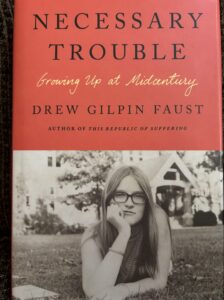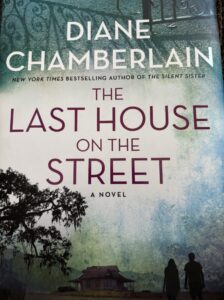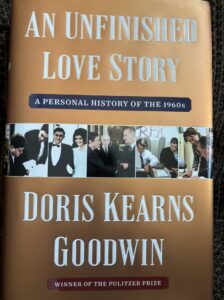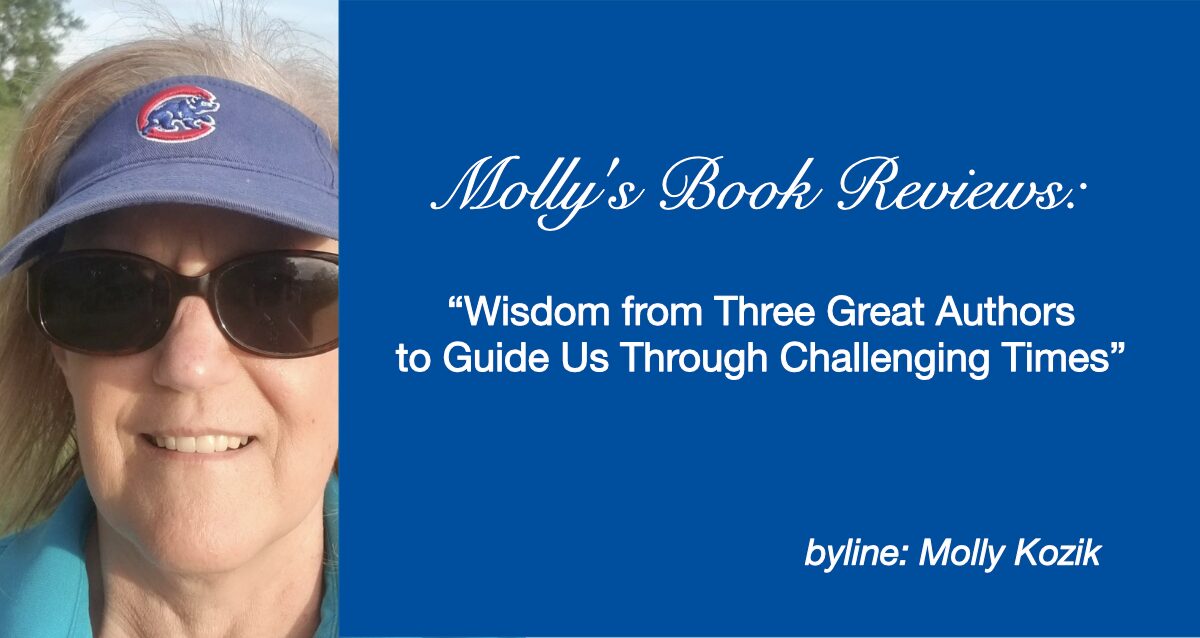President Lyndon Johnson signed the Voting Rights Act of 1965 into law. Now that 1965 is considered “history” it’s a good time look back at that time in our nation’s civil rights history and read about the women who took up the cause sixty years ago.

Many Kane County Democratic Women wear “Making Good Trouble” shirts to our protests. I can imagine Ellie Hockley, Drew Gilpin and Doris Kearns wearing similar attire sixty years ago as they talked to Black residents and registered them to vote after the Voting Rights Act was signed into law.
Popular novelist Diane Chamberlain wrote about the fictional character Ellie Hockley in her 2021 book The Last House on the Street. Ellie was a white girl living in North Carolina when she uprooted her college summer break to join an integrated group of college students who travelled the rural South registering Black voters. On their door to door travels, she fought the prejudices of her White family and the Blacks and Whites of her native North Carolina. The novel follows Ellie in 1965 and follows Ellie and a mystery that awaits her and a neighbor in 2010.
Although Ellie is a fictional character she belonged to a real group that organized volunteers in the Deep South. The novel talks about the Summer Community Organization and Political Education Project (SCOPE) and its lofty aim to remove racism from American politics.

A Black student in Ellie’s group explained the importance of voting for rural Blacks in the South. “The right to vote will mean a better life for their kids in the future, but people need the concrete ways it can change their lives right now. Roads. Electricity. Plumbing. A decent minimum wage.”
I was reminded of Ellie and SCOPE, when I heard an NPR interview about a memoir that the first woman president of Harvard University wrote about her life in segregated Virginia up till her 1968 graduation from Bryn Mawr College in Pennsylvania. Necessary Trouble Growing up at Midcentury by Drew Gilpin Faust is a history of her family that formed her and how she involved herself in the political unrest of the 1960s.
Already an activist with the Students for a Democratic Society (SDS), Drew observed political unrest in Alabama from her campus. She watched on television as the events of Bloody Sunday unfolded in Selma, Alabama on March 7, 1965.
“From that moment, I knew I had to do something. If I did not stand up, if I did not act after witnessing this, I would be ashamed forever,” she wrote in her memoir.
Drew skipped a midterm and had a friend type out and turn in her rough draft of an English paper for her and took off with her boyfriend and a borrowed car to head to Alabama. And days later she was in a mass of people on the Edmund Pettus Bridge herself!
I thought about Ellie when I read Drew Gilpin’s account of her actions and reactions during the protests of March 1965.
That brings me to the final book in this trio of 1960s history An Unfinished Love Story A Personal History of the 1960s by Doris Kearns Goodwin.
Doris Kearns and Richard Goodwin were eyewitnesses to the events of the 1960s. Kearns and Goodwin both worked for President Johnson but Goodwin left the president in 1968 before Kearns started working in the president’s office. Goodwin wrote parts of the Voting Rights Act of 1965 and wrote Johnson’s “We Shall Overcome” speech that helped pass the law.

Doris and Dick met in 1972 at Harvard and married in 1975. They were sorting through Dick’s White House archives a few years before his death in 2018 and were writing his memoir. Doris eventually finished the book and it was published in 2024.
Historian Doris Kearns Goodwin writes a fascinating story about what each of them did during the tumultuous mid 1960s before they met. The personal stories that her husband shared with her for this book are wonderful to read. And yes, this is a love story. I dare you not to cry at the end.
Unfortunately, recent Supreme Court Rulings have weakened the Voting Rights Act of 1965. Make the time to read one, two or three of these books to learn more about voting rights to give you perspective on where we are today.

